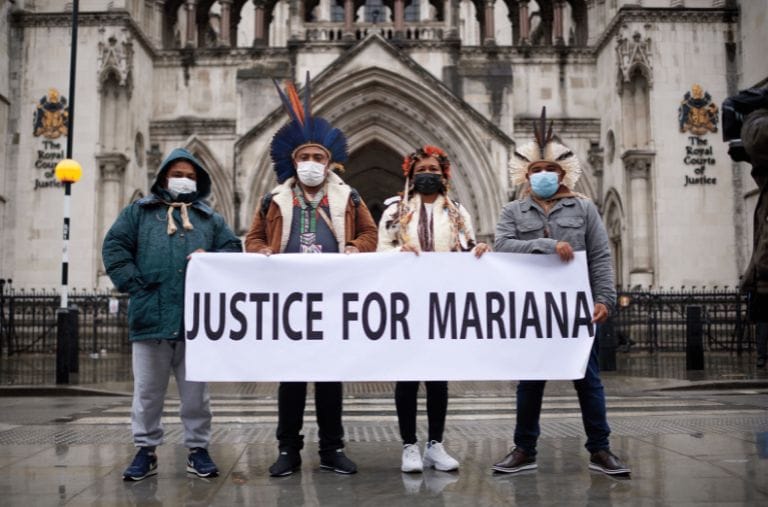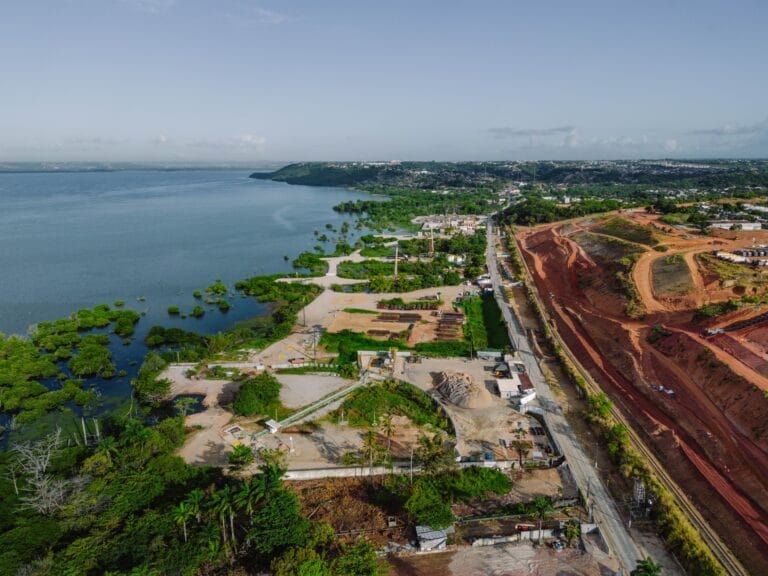Victims of Brazil’s worst environmental disaster are celebrating today after a landmark ruling ensured that FTSE 100 mining giant BHP will now finally face their day of reckoning in the English courts.
Largest ever English litigation
Over 200,000 claimants have been given the go ahead to pursue the largest ever litigation in England against BHP, one of the biggest companies in the world, for their involvement in the Mariana dam collapse.
The failure of the dam, which held toxic mining waste, has changed the course of the claimants’ lives forever.
But now they are one step closer to justice after the Court of Appeal released their unanimous judgment today affirming the jurisdiction of the English courts to hear the claim; – ensuring BHP will have to account for their role in the 2015 disaster.
Court of Appeal Judgment
In a 107-page unanimous judgment, the Court of Appeal has allowed hundreds of thousands of Brazilians the possibility to finally see justice for the deadly disaster.
The court ruled: “The vast majority of claimants who have recovered damages have only received very modest sums in respect of moral damages for interruption to their water supply.
“The claims in this action are already three years old and the only reason they have not substantively progressed is the delay caused by the applications which have been made by the defendants.
“Our conclusion is simply that the remedies available in Brazil are not so obviously adequate that it can be said to be pointless and wasteful to pursue proceedings in [England].
“There is a realistic prospect of a trial yielding a real and legitimate advantage for the claimants such as to outweigh the disadvantages for the parties in terms of expense and the wider public interest in terms of court resources.
“The claimants should be permitted now to proceed with the claims in the action.”
The Mariana dam disaster
BHP are the ultimate parent company of BHP Brazil, who own and operate, together with Vale, the Fundão dam in Mariana which burst on 5 November 2015 and sent around 40 million cubic metres of toxic mining waste over 700km of waterways along the River Doce, killing 19 people and obliterating all in its way.
The dam burst resulted in villages being buried, thousands being made homeless, and farms, fish stocks and livelihoods being destroyed by toxic waste, containing heavy metals arsenic, mercury, nickel and aluminium, and contaminating everything in its path, including water supply.
Torrents of polluted water and mud ran for 700km, more than the equivalent of the distance between London and Edinburgh, and into the Atlantic Ocean, taking an estimated £2.5bn toll on the region’s biodiversity and leaving effects which are still being felt to this day.
Yet more than six years later the victims have not received justice or full and fair compensation from the companies involved.
Representatives of the Krenak indigenous communities, local mayors, attorneys general and other claimants who were all affected by the disaster, flew to London in April to hear their case in the Court of Appeal and have now reacted to the landmark ruling.
Victim’s account of the Fundão dam collapse
Yorkshireman Jonathan Knowles, who lost his home, business and livelihood in Brazil as a result of the dam collapse said:
“It is hard to put into words what the success of this case means to the victims of the disaster. We, along with so many others, lost our entire lives – the way we lived, the way we earned money, the way we ate and drank.
“To see this case through and be awarded enough money for a deposit, to start again, properly, that’s all we dare hope for.
“Since the day we heard the dam was collapsing it has been about survival. The companies involved have only insulted our intelligence with their efforts. I could no longer trust that the home we had built and the life we led would be safe for my son and wife.”
The claimants, represented by global environmental litigators Pogust Goodhead, seek full compensation for the losses suffered following the collapse of the dam in the state of Minas Gerais, Brazil.
The claimants include over c.200,000 individuals, 530 businesses, 145 members of indigenous communities, 25 municipalities and 15 faith-based institutions.
Comment from Pogust Goodhead
Managing Partner Tom Goodhead said: “This is a monumental judgement that means the victims of the worst environmental disaster ever seen in Brazil are a step closer to justice.
“BHP is a multinational that generates huge profits in the regions where it operates, and it is only right that they are held directly accountable in the UK. The days of huge corporations doing what they want in countries on the other side of the world and getting away with it are over.
“This is a huge step forward in not only securing justice for our clients but also sending a wider message to large multinational businesses that they cannot run major operations in countries around the world – and then hide behind their subsidiaries when things go wrong.
“It is time that BHP stops delaying justice and do the right thing.”
Welcoming the judgment, Pogust Goodhead Chairman Harris Pogust hit out at BHP’s latest greenwashing attempt. He said:
“Last week, to huge fanfare, BHP set out their social value targets and how they are going to leave the world a better place. It was the best example of corporate greenwashing I have ever seen. It goes without saying that these ‘social and environmental’ commitments are not worth the paper they are written on until real justice is provided to the victims of the Mariana Dam disaster for the misery and despair they have suffered at the hands of BHP.
“To this day, the effects of the disaster are being felt in Minas Gerais and Espírito Santo. The river is still contaminated, people are still homeless, and they can no longer grow crops and can no longer drink from the water.
“Every time the river floods in periods of heavy rain, the toxic metals from the iron ore waste continue to contaminate the land, roads and homes of the people who live near the river. That is why this case is so important and why we are delighted the Court have given permission for it to proceed.”
Pogust Goodhead filed the lawsuit in England in 2018, and in July last year, won the right to reopen the case through a landmark judgment after an earlier ruling denying jurisdiction of the English courts to hear the case. The first instance decision denying jurisdiction was re-examined on appeal by the Court of Appeal throughout the five-day hearing in April 2022.









